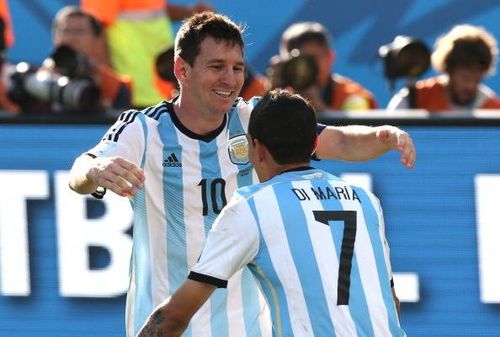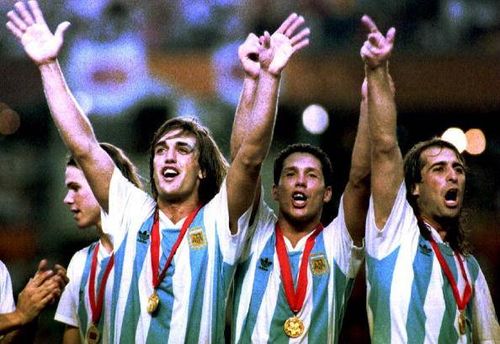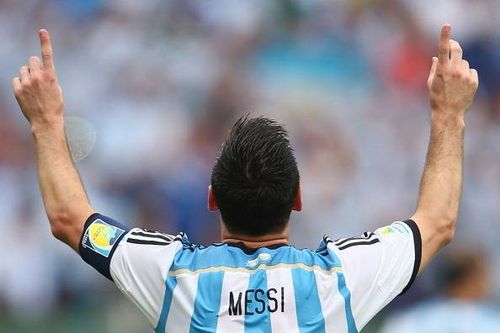
Breaking down Argentina's chances of winning the 2015 Copa America

The stage is all set for Argentina as they look to claim a precious Copa America victory to the backdrop of a Chilean winter this June. Gerardo Martino’s men will be hoping, however, that it will not be their low season, too. Returning to South America as a group, much will be made of their attempt to claim revenge for their World Cup final defeat to Germany. Because although they are not heading to the spiritual home of football, they have a fantastic opportunity to ease the pain of a wound that, no doubt, still hurts to this day.
Carrying a squad jam-packed with the finest stars around, much has been made of their tag as “favourites” – but they have been in this position many times before, so their fans will be forgiven for being just a little bit wary of what’s to come. For the Argentines, there is a lot at stake. Aside from instilling confidence in the supporters, continuing to play smart but effective football and maintaining their penchant for victory in the Copa America, they will also have to play with the burden of expectancy from elsewhere.
Can they do it? Let’s take a look.
La Albiceleste gunning for record-equalling 15th Copa America title
Shockingly, it has been 22 years since Argentina last won this title. Arriving as far back as 1993, it would have been hard to believe that the night they overcame Mexico 2-1 in the final, amidst a sea of excitement and vivacious energy was to mark the beginning of such a long, drawn-out wait.
At a time when Nintendo, “curtain hair” and desktop computers were the dandiest things around, Argentina were the kings of South American football thanks to the stylings of a certain Alfio Basile who set his team out to play with a clever physicality which fused itself nicely with a sharp, unforgiving attack.
Interestingly, that victory marked their arrival at the pinnacle of the Copa America ladder as it saw them sneak ahead of Uruguay in terms of total titles won – something La Celeste have since rectified with their 1995 and 2011 triumphs.
Boasting players like Gabriel Batistuta (who pocketed a fine brace in the ‘93 final), Fernando Redondo, Diego Simeone and Gustavo Zapata – Argentina had a fantastic bunch of players at their disposal the last time they won – arguably, this time around, they have a far superior collection of stars who will be disappointed with anything other than a resounding win. Of course, they ought to be fuelled not only by their personal desires to do well but by a push for historical significance.

These players can become history makers, just as their predecessors from ‘93 were as they look to catch up with their Uruguayan opponents. And with Luis Suarez missing due to his ban, the Argentines have been dealt an even stronger hand.
If the players can harness the positive energy instead of seeing it as a crushing weight, this could really be their year once more. Coincidentally, the last time Chile played host to this competition, just take a wild guess as to which team won.
Perhaps ominously, it was Argentina.
Lionel Messi will need to rise to the big occasion
What an impeccable season it has been for Lionel Messi already. With so much to savour, this has been nothing short of the perfect season for Argentina’s greatest footballing hero.
Tirelessly, the diminutive Argentine has worked wonders to dismantle the bad memories of the early part of this season, swapping them for personal and collective glory along the way, and the Copa America crown could yet be the fantastic final piece to complete an already fetching ensemble. Of course, as he has done so many times already this season, the Barcelona attacker will need to conjure the goods.
Sure, some will say that he has often lacked the same spark on international duty, but that can all change in a flash – after all, he is the greatest player on the planet right now, so it’s sort of difficult to write him off, despite what history is keen to tell us. Scoring goals for fun has often been in his repertoire, and while it’s expected he won’t hit the ground running against Paraguay, he ought to grow into the tournament the more it goes on, and the more they stay competitive as a group.

Lacking the usually serene magisterial quality he oozes on the club front, many of his critics say he loses a lot of his magic when he isn’t the focal point of the attack. Playing alongside the likes of Sergio Aguero, Angel Di Maria and Carlos Tevez, La Pulga can sometimes become anonymous.
But a quick look at his last four appearances for his home country shows that Messi has scored three times, all of those goals coming in friendlies against Hong Kong and Croatia – not the most testing of opponents sure, but they arrived in the middle of his season when his attentions were certainly elsewhere.
Add this to the fact he played a key role in helping to guide his team to the World Cup final in Brazil with four goals and it becomes abundantly clear that he has the capacity to harm just about anyone in the famous blue-and-white striped kit. Neutrals will hope he does it again in the coming weeks.
Getting the best out of fatigued players will be Martino’s biggest test
Managing a side which has seen many of its players feature in some hectic schedules across Europe will no doubt be one of the biggest potential drawbacks.
True, many of their Copa America challengers will draw parallels with them in this regard, but if the likes of Colombia, Chile, Uruguay and Brazil manage to get it right while La Albiceleste get it wrong, that could be the necessary difference. Clearly then, despite a wave of support, as well as nine months of relatively inconsequential friendlies, behind them, Argentina are in a similar position to everyone else ready to compete.
Looking more closely at it, some discrepancies start to emerge.

We can see that Argentina have four players in their squad who ply their trade with either Barca or Juventus (Messi, Javier Mascherano, Roberto Pereyra and Carlos Tevez). Meanwhile, just three of their players compete outside of Europe (Nahuel Guzman, Fernando Gago and Milton Casco).
As for their nearest challengers mentioned above – both Los Cafeteros and Los Charrúas have no players in either Champions League final squad, Chile have two, while A Selecao have just one – Neymar Jr. Collectively, too, the trio of sides – not including Brazil – have as many as 23 performers who currently play outside of Europe, a statistic that surely points to either Argentina or Brazil emerging victorious come the final match.
While this potentially points to a gulf in class between Argentina and the rest of the teams, it also underlines a certain weakness. With less than a week to rest, prepare and gel as a squad without some of their key performers after the potentially draining final at the Olympiastadion in Berlin comes to a conclusion, they could experience a sluggish start in their efforts to escape Group B.
Just how well they react as a group after a potentially turbulent start could well decide the tone, and outcome, of their overall campaign.